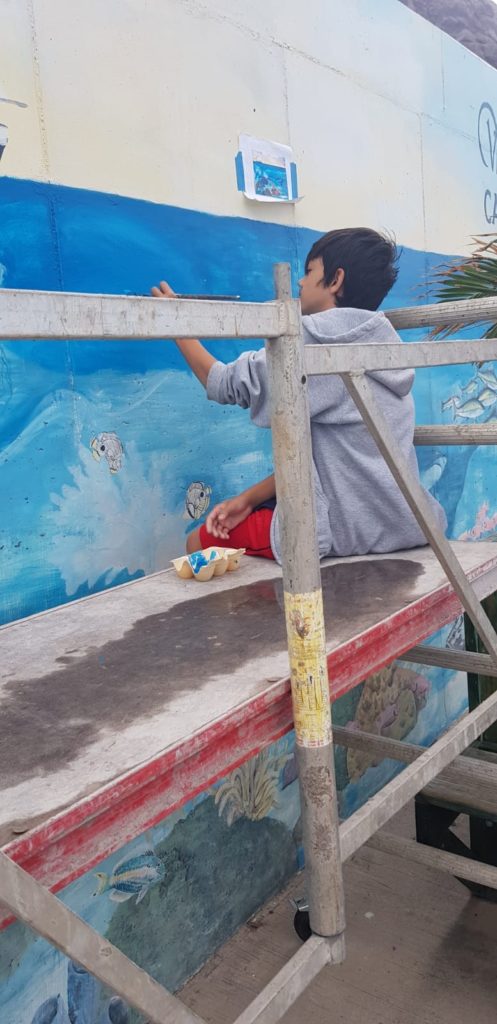Working together to make good things happen on Saba
‘Tremendous developments are taking place in the arts and culture on Saba. A Quality Cultural Education subsidy has been a big part of making that happen. I fully recognise that we still have a long way to go. But we have made significant advances in stepping up cooperation. The lines of communication between people from the education and the culture sector are far more open and they are already organising joint activities.’
Expanding horizons
‘Social and cultural education is important to us as a school. We want to introduce our students to all forms of culture and the arts: from the visual arts and drama to dance, music and heritage. Since the Covid pandemic, many online opportunities for arts activities have been launched, but nothing can beat a live performance or museum visit. That is also my mission for teachers: to encourage everyone to look beyond the island. Teachers need to go out into the wider world, to expand their horizons. Our drama club is keen to go to New York, to see the major productions for themselves. This can give them an appreciation for the profession and the people who practise it. Back on Saba, you can then combine those experiences with your own culture.’
Saba’s own cultural canon
‘For our activities as part of the Quality Cultural Education programme, we have drawn inspiration from the Canon of the Netherlands. Here on Saba, we have come up with our own cultural canon: Saba from A to Z. Our aim in doing so is to keep Saban traditions alive and develop them further. To show young people that things were different in the past, not necessarily better, but perhaps more beautiful. And that this is something they can be proud of. With the canon, we have taken a first step: this is our heritage as we see it today. And we can then consider how to respond to it as a school through classes or excursions. Of course, we hope this will go beyond the school and become something the whole island can become involved in. On 15 May, we are planning to present Saba from A to Z.’
< article continues below >

Mandatory after-school arts classes
‘The arts and cultural activities are connected to the canon as much as possible and form part of student learning in the arts subjects and in social studies. For the most part, the arts subjects are offered through after-school activities: this means Child Focus at primary level and clubs at the secondary school. It is mandatory for students to take part in two clubs a week. For one year, they are given an introduction to an arts subject. Even students who are initially less enthusiastic about a certain subject discover the fun side and reap the rewards as the year progresses. The arts are also about commitment and perseverance.
Sometimes there is only one child in ballet class. But even so, I want to give that child the opportunity. We have talented teachers for the art subjects, people who not only enable children to discover their talent, but who also teach them how to work together and present their skills. Quality is an important part of our arts classes.’
A mix of nationalities and cultures
Diversity is a primary focus of the school plan. Between 15 and 20 different nationalities live side by side on Saba, each with their own culture. ‘Valuing your own culture, but also being aware of the added value of other cultures, is important to us. Within that broad diversity, we also look at what is typically Saban. Music and dance, for example. Or costumes and certain customs.’
Making your way with confidence
‘As I see it, education is all about giving students the confidence and the assurance to make their way in the world. I want them to be proud of what they can do, while also understanding what lies beyond their capabilities. This includes appreciation of and pride in your own culture and all forms of expression. That is why the arts and culture are important. By practising the arts, you also learn that it takes focus, time, energy and perseverance to achieve things, to become good at something. Not only that, but you learn to overcome your fear of standing in front of an audience and how to present yourself confidently on stage.’
Cultural policy for the whole island
‘To offer these opportunities to students on the island, we plan to increase our commitment to cooperation. Ownership of Quality Cultural Education lies with the education sector. Through our role in education, we can contribute to the cultural policy of the entire island. Taking a joint look at the need for education, creating a cultural agenda, and perhaps organising festivals; we’re working together to make good things happen.’
Reageer (je reactie verschijnt na goedkeuring, vanwege spam)